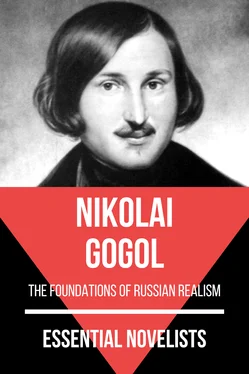“Ugh! What horrible things you say!” put in Madame.
“Well, my dear, that is how things are done, and it is no fault of mine that it is so. Moreover, everything that is left over—everything that WE (pardon me for mentioning it) cast into the slop-pail—is used by such folk for making soup.”
“Always at table you begin talking like this!” objected his helpmeet.
“And why not?” said Sobakevitch. “I tell you straight that I would not eat such nastiness, even had I made it myself. Sugar a frog as much as you like, but never shall it pass MY lips. Nor would I swallow an oyster, for I know only too well what an oyster may resemble. But have some mutton, friend Chichikov. It is shoulder of mutton, and very different stuff from the mutton which they cook in noble kitchens—mutton which has been kicking about the market-place four days or more. All that sort of cookery has been invented by French and German doctors, and I should like to hang them for having done so. They go and prescribe diets and a hunger cure as though what suits their flaccid German systems will agree with a Russian stomach! Such devices are no good at all.” Sobakevitch shook his head wrathfully. “Fellows like those are for ever talking of civilisation. As if THAT sort of thing was civilisation! Phew!” (Perhaps the speaker’s concluding exclamation would have been even stronger had he not been seated at table.) “For myself, I will have none of it. When I eat pork at a meal, give me the WHOLE pig; when mutton, the WHOLE sheep; when goose, the WHOLE of the bird. Two dishes are better than a thousand, provided that one can eat of them as much as one wants.”
And he proceeded to put precept into practice by taking half the shoulder of mutton on to his plate, and then devouring it down to the last morsel of gristle and bone.
“My word!” reflected Chichikov. “The fellow has a pretty good holding capacity!”
“None of it for me,” repeated Sobakevitch as he wiped his hands on his napkin. “I don’t intend to be like a fellow named Plushkin, who owns eight hundred souls, yet dines worse than does my shepherd.”
“Who is Plushkin?” asked Chichikov.
“A miser,” replied Sobakevitch. “Such a miser as never you could imagine. Even convicts in prison live better than he does. And he starves his servants as well.”
“Really?” ejaculated Chichikov, greatly interested. “Should you, then, say that he has lost many peasants by death?”
“Certainly. They keep dying like flies.”
“Then how far from here does he reside?”
“About five versts.”
“Only five versts?” exclaimed Chichikov, feeling his heart beating joyously. “Ought one, when leaving your gates, to turn to the right or to the left?”
“I should be sorry to tell you the way to the house of such a cur,” said Sobakevitch. “A man had far better go to hell than to Plushkin’s.”
“Quite so,” responded Chichikov. “My only reason for asking you is that it interests me to become acquainted with any and every sort of locality.”
To the shoulder of mutton there succeeded, in turn, cutlets (each one larger than a plate), a turkey of about the size of a calf, eggs, rice, pastry, and every conceivable thing which could possibly be put into a stomach. There the meal ended. When he rose from table Chichikov felt as though a pood’s weight were inside him. In the drawing-room the company found dessert awaiting them in the shape of pears, plums, and apples; but since neither host nor guest could tackle these particular dainties the hostess removed them to another room. Taking advantage of her absence, Chichikov turned to Sobakevitch (who, prone in an armchair, seemed, after his ponderous meal, to be capable of doing little beyond belching and grunting—each such grunt or belch necessitating a subsequent signing of the cross over the mouth), and intimated to him a desire to have a little private conversation concerning a certain matter. At this moment the hostess returned.
“Here is more dessert,” she said. “Pray have a few radishes stewed in honey.”
“Later, later,” replied Sobakevitch. “Do you go to your room, and Paul Ivanovitch and I will take off our coats and have a nap.”
Upon this the good lady expressed her readiness to send for feather beds and cushions, but her husband expressed a preference for slumbering in an armchair, and she therefore departed. When she had gone Sobakevitch inclined his head in an attitude of willingness to listen to Chichikov’s business. Our hero began in a sort of detached manner—touching lightly upon the subject of the Russian Empire, and expatiating upon the immensity of the same, and saying that even the Empire of Ancient Rome had been of considerably smaller dimensions. Meanwhile Sobakevitch sat with his head drooping.
From that Chichikov went on to remark that, according to the statutes of the said Russian Empire (which yielded to none in glory—so much so that foreigners marvelled at it), peasants on the census lists who had ended their earthly careers were nevertheless, on the rendering of new lists, returned equally with the living, to the end that the courts might be relieved of a multitude of trifling, useless emendations which might complicate the already sufficiently complex mechanism of the State. Nevertheless, said Chichikov, the general equity of this measure did not obviate a certain amount of annoyance to landowners, since it forced them to pay upon a non-living article the tax due upon a living. Hence (our hero concluded) he (Chichikov) was prepared, owing to the personal respect which he felt for Sobakevitch, to relieve him, in part, of the irksome obligation referred to (in passing, it may be said that Chichikov referred to his principal point only guardedly, for he called the souls which he was seeking not “dead,” but “non-existent”).
Meanwhile Sobakevitch listened with bent head; though something like a trace of expression dawned in his face as he did so. Ordinarily his body lacked a soul—or, if he did possess a soul, he seemed to keep it elsewhere than where it ought to have been; so that, buried beneath mountains (as it were) or enclosed within a massive shell, its movements produced no sort of agitation on the surface.
“Well?” said Chichikov—though not without a certain tremor of diffidence as to the possible response.
“You are after dead souls?” were Sobakevitch’s perfectly simple words. He spoke without the least surprise in his tone, and much as though the conversation had been turning on grain.
“Yes,” replied Chichikov, and then, as before, softened down the expression “dead souls.”
“They are to be found,” said Sobakevitch. “Why should they not be?”
“Then of course you will be glad to get rid of any that you may chance to have?”
“Yes, I shall have no objection to SELLING them.” At this point the speaker raised his head a little, for it had struck him that surely the would-be buyer must have some advantage in view.
Конец ознакомительного фрагмента.
Текст предоставлен ООО «ЛитРес».
Прочитайте эту книгу целиком, купив полную легальную версию на ЛитРес.
Безопасно оплатить книгу можно банковской картой Visa, MasterCard, Maestro, со счета мобильного телефона, с платежного терминала, в салоне МТС или Связной, через PayPal, WebMoney, Яндекс.Деньги, QIWI Кошелек, бонусными картами или другим удобным Вам способом.












